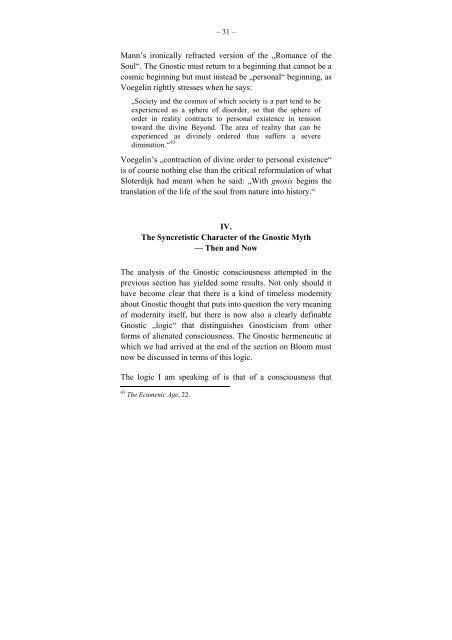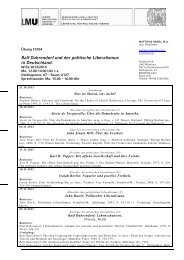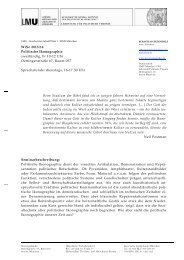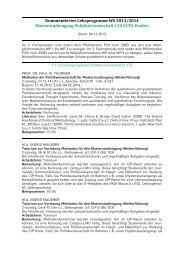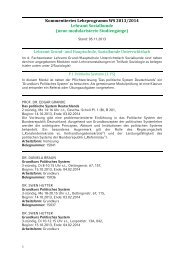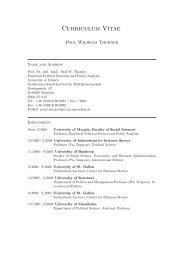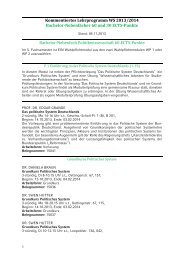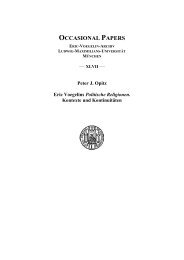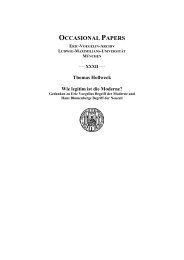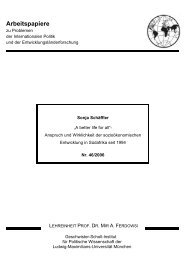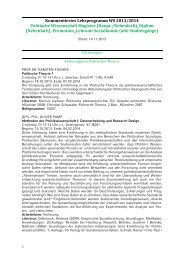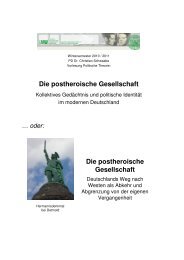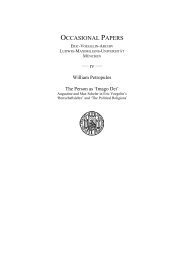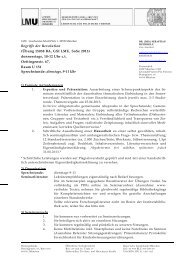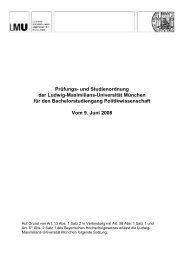THOMAS HOLLWECK is Associate Professor of German at
THOMAS HOLLWECK is Associate Professor of German at
THOMAS HOLLWECK is Associate Professor of German at
You also want an ePaper? Increase the reach of your titles
YUMPU automatically turns print PDFs into web optimized ePapers that Google loves.
– 31 –<br />
Mann’s ironically refracted version <strong>of</strong> the „Romance <strong>of</strong> the<br />
Soul“. The Gnostic must return to a beginning th<strong>at</strong> cannot be a<br />
cosmic beginning but must instead be „personal“ beginning, as<br />
Voegelin rightly stresses when he says:<br />
„Society and the cosmos <strong>of</strong> which society <strong>is</strong> a part tend to be<br />
experienced as a sphere <strong>of</strong> d<strong>is</strong>order, so th<strong>at</strong> the sphere <strong>of</strong><br />
order in reality contracts to personal ex<strong>is</strong>tence in tension<br />
toward the divine Beyond. The area <strong>of</strong> reality th<strong>at</strong> can be<br />
experienced as divinely ordered thus suffers a severe<br />
diminution.“ 43<br />
Voegelin’s „contraction <strong>of</strong> divine order to personal ex<strong>is</strong>tence“<br />
<strong>is</strong> <strong>of</strong> course nothing else than the critical reformul<strong>at</strong>ion <strong>of</strong> wh<strong>at</strong><br />
Sloterdijk had meant when he said: „With gnos<strong>is</strong> begins the<br />
transl<strong>at</strong>ion <strong>of</strong> the life <strong>of</strong> the soul from n<strong>at</strong>ure into h<strong>is</strong>tory.“<br />
IV.<br />
The Syncret<strong>is</strong>tic Character <strong>of</strong> the Gnostic Myth<br />
— Then and Now<br />
The analys<strong>is</strong> <strong>of</strong> the Gnostic consciousness <strong>at</strong>tempted in the<br />
previous section has yielded some results. Not only should it<br />
have become clear th<strong>at</strong> there <strong>is</strong> a kind <strong>of</strong> timeless modernity<br />
about Gnostic thought th<strong>at</strong> puts into question the very meaning<br />
<strong>of</strong> modernity itself, but there <strong>is</strong> now also a clearly definable<br />
Gnostic „logic“ th<strong>at</strong> d<strong>is</strong>tingu<strong>is</strong>hes Gnostic<strong>is</strong>m from other<br />
forms <strong>of</strong> alien<strong>at</strong>ed consciousness. The Gnostic hermeneutic <strong>at</strong><br />
which we had arrived <strong>at</strong> the end <strong>of</strong> the section on Bloom must<br />
now be d<strong>is</strong>cussed in terms <strong>of</strong> th<strong>is</strong> logic.<br />
The logic I am speaking <strong>of</strong> <strong>is</strong> th<strong>at</strong> <strong>of</strong> a consciousness th<strong>at</strong><br />
43 The Ecumenic Age, 22.


